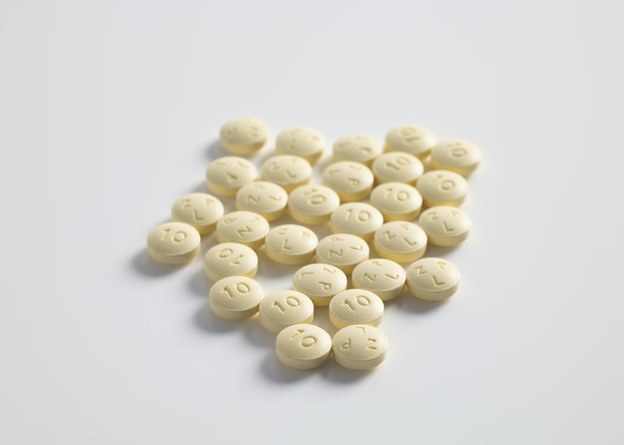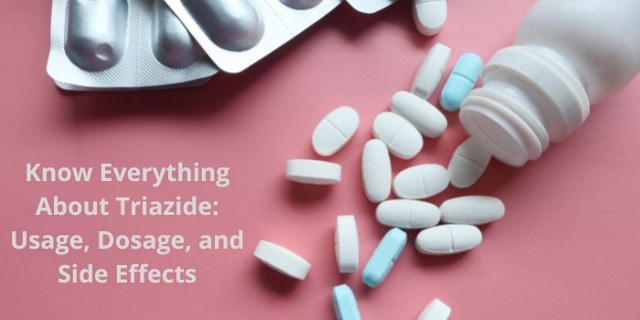Triazide or Apo Triazide is the brand name for an oral diuretic (water pill) manufactured in Canada. The medication is a combination drug featuring two medications, triamterene and hydrochlorothiazide.
Both drugs are diuretics, and one literature review shows that doctors have used hydrochlorothiazide as a diuretic for over half a century. Diuretics typically treat edema or conditions that trigger fluid retention in the body.

According to one survey, 300000 Canadians suffer from chronic edema, and escalating morbid obesity predicts a rise in edema cases. Edema has various causes, and Triazide is among the first-line therapies for different edema cases, as explained below.
How Does Triazide Work?
Triazide is a diuretic drug composed of two diuretic medications. Diuretics help manage edema or swelling caused by excessive fluid retention by ridding the body of the excess water via urination. Therefore, diuretics increase urine output.
Their mechanism of action entails inhibiting salt reabsorption in the kidney’s nephrons. Nephrons are the kidney’s filtration system and function by filtering urea (protein metabolism byproduct), water, and other wastes, including excess inorganic salts. Inorganic salts like sodium and potassium are vital for body functions like facilitating electrical signal transmission in nerve impulses and muscle contraction. However, their elevated levels cause water retention in the body.
To generate urine, the nephrons utilize a three-step process, filtration, reabsorption, and secretion. During filtration, thin blood vessels called the glomerulus filter blood as it flows into the nephrons. The glomerulus keeps larger molecules like proteins from entering the nephrons while allowing water, urea, and other smaller molecules entry.
Second, the glomerulus commences reabsorptions, whereby it channels the essential nutrients, minerals, and water back to the primary circulatory system and out of the kidney via the renal vein. Inorganic salt reabsorption occurs via respective epithelia channels (epithelial potassium channel and epithelial sodium channel) to facilitate an equilibrium, and the kidneys secrete the realized waste as urine.
However, one literature review points to abnormal epithelial channel activation as edema’s root cause. The review posits that dysfunction along epithelial channels causes elevated salt levels leading to edema.

Uses of Triazide
Nonetheless, edema as a health issue is the symptom of an underlying problem. Multiple medical conditions can trigger edema, including kidney disease, congestive heart failure, varicose veins, and lymphatic diseases. Therefore, diagnosing the underlying health problem is vital to managing edema.
Diuretics like Triazide reduce inorganic salt reabsorption into the blood, elevating urine salt levels in nephron-filtered waste so that more water moves towards the waste to form urine.
According to one review, the triamterene component in Triazide is a first-line edema therapy that inhibits sodium epithelial channels but has potassium-sparing actions. Some diuretics can cause potassium deficiency during epithelia channel modulation, forcing patients to take potassium supplements.
On the other hand, a second review shows hydrochlorothiazide is an FDA-approved adjunct therapy medication for edema. While hydrochlorothiazide does not have potassium-sparing properties, it also treats high blood pressure.
Edema has multiple causes, meaning you cannot treat all edema cases using a single drug. Consequently, it is ill-advised to buy Triazide without a prescription as you may aggravate the edema.
Doctors can prescribe Triazide for mild-moderate high blood pressure, kidney issues, and heart attacks. While Triazide is the brand name for the triamterene + hydrochlorothiazide combo, generic drugs featuring similar active ingredients but different brand names are available if you wish to buy Triazide Canada.
Triazide Usage And Dosage
Each triazide tablet contains 50mg of triamterene and 25mg of hydrochlorothiazide. The drug’s ideal dosages for managing edema and high blood pressure range from at least one Triazide tablet taken daily to a maximum of four in two daily doses.
Doctors hold the discretion to prescribe tailored Triazide doses based on your health level, medical history, underlying medical conditions, and possible drug interactions. Moreover, your pharmacokinetics or your body’s unique response to the drug could influence dosage. Therefore, a doctor can adjust your Triazide dose depending on your response to the drug.
Second, Triazide causes discomfort when taken on an empty stomach, so doctors recommend taking your dosage after meals. For a single dose, consider taking the drug in the morning, preferably after breakfast.
Alternatively, you can take the first dose after breakfast and the second one after dinner if your doctor prescribed two doses. Take the dose at the same time(s) every day and do not double the dosage to compensate for missed doses.
Third, Triazide’s diuretic effect will cause you to take many bathroom breaks, especially if you take the drug for edema. Therefore, avoid taking the medication too close to bedtime as frequent nighttime urination qualifies as a sleep disturbance. Sleep disturbances disrupt your sleep patterns and can compromise vital body functions, including cognitive functions, the immune system, and healing.
Fourth, you should take Triazide as prescribed consistently for best results, so complete your dose, even if you feel better. You can discuss alternative therapies with your doctor if you think that your condition is improving. Lastly, alcohol alters Triazide’s function, so minimize your alcohol consumption, or avoid alcohol altogether while taking the drug.

Triazide Side Effects
Triazide is a relatively safe drug prescribed to patients in Canada and beyond; moreover, the chances of allergic reactions to the drug are minimal. However, it is not without some uncomfortable side effects. Below is a highlight of the mild to moderate side effects you may experience while taking the drug.
- Dizziness
- Lightheadedness
- Headaches
- Stomachaches
- Dehydration (dry mouth)
- Appetite Loss
- Constipation
- Diarrhea
- Nausea and vomiting
- Agitation
While most of the mild symptoms above disappear on their own, contact a doctor or emergency services if you experience the following:
- Fainting
- Muscle cramps
- Blurred vision
- Skin discoloration, rashes, or blistering
- Anemic symptoms like pale skin, weakness, and shortness of breath

Who Should Not Use Triazide? Risks and Precautions
Triazide is a prescription medication, meaning that doctors have the discretion to decide whether or not to prescribe the drug according to patient symptoms and health history. However, individuals in the following categories should not take Triazide due to possible adverse health risks.
- People with diabetes: The hydrochlorothiazide in Triazide affects blood sugar modulation, making it challenging for people with diabetes to maintain ideal blood sugar levels. Moreover, hyperkalemia or elevated potassium serum levels is likely to occur in diabetes patients taking Triazide.
- Glaucoma patients: Hydrochlorothiazide triggers the blurred vision side effect and could aggravate glaucoma.
- Individuals with sulfa allergies: While Triazide has a low allergy risk, it is likely to trigger an allergic reaction among patients with sulfa allergies. Therefore, call a doctor if you experience a rash, difficulty breathing, swelling in the mouth, or acute dizziness after taking the drug.
- Pregnant and lactating mothers: Hydrochlorothiazide crosses the placenta and may harm an unborn fetus or a lactating baby.
- Children: While Triazide is safe for use, no research is available on its tolerability among children.
Conclusion:
Triazide is a drug proven effective in managing edema and blood pressure, and its benefits outweigh the possible risks. However, consult your doctor, even if no prescription needed Triazide is available, to minimize the risk of adverse occurrences.
Resources:
https://www.ncbi.nlm.nih.gov/books/NBK430766/
https://pubmed.ncbi.nlm.nih.gov/24618210/
https://www.ncbi.nlm.nih.gov/pmc/articles/PMC6341062/
https://www.ncbi.nlm.nih.gov/books/NBK547859/
https://www.ncbi.nlm.nih.gov/books/NBK532918/

